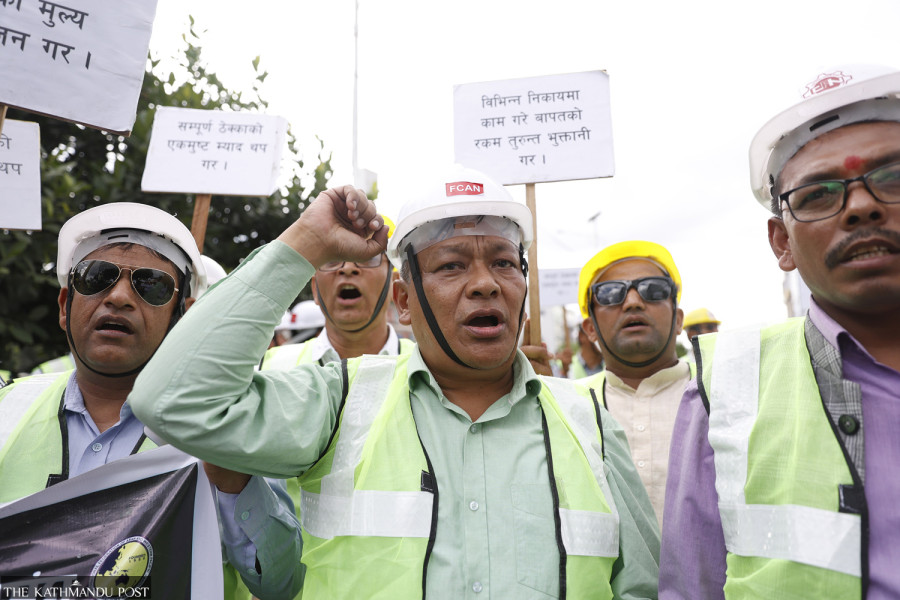National
Contractors hit streets seeking payments
Federation of Contractors’ Association of Nepal says government owes them Rs50 billion in dues from last fiscal year.
Prithvi Man Shrestha
Contractors have been hitting the streets demanding payments for their completed works amid the delay caused by government agencies due to a resource crunch.
Besides demanding overdue payments from the government, they are also seeking extension of the contracts and price adjustments to adjust with inflation.
Contractors, who have taken to the streets for the past one and a half weeks, took out a protest march on Tuesday in front of the prime minister’s residence at Baluwatar and also in front of the parliament building at New Baneshwar, Kathmandu.
“The government agencies owe contractors around Rs50 billion,” said Rabi Singh, president of Federation of Contractors’ Association of Nepal (FCAN).
He added: “We have learnt that the government agencies are planning to pay contractors Rs10 billion by transferring funds from other budget headers. (But), that would not be enough because then the remaining Rs40 billion will still be outstanding.”
Singh said that the government agencies have not paid the contractors in full arguing that the contractors had failed to complete the works as mentioned in the contracts. “Rainfall, festivals and elections as well as the delay in the timely payment of mobilisation advance affected the work of the contractors.”
The government struggled to generate resources in the last fiscal year as Nepal’s imports slumped, initially due to import restricting measures as well as a general slump in economic activities across the country.
According to the Finance Ministry, the government failed to meet its revenue target by as much Rs400 billion in the last fiscal year. It had set a revenue collection target of Rs1.4 trillion while the actual collection was only Rs1.01 trillion, according to the latest figures released by the ministry.
In the fiscal year 2021-2022, the revenue collection stood at R1.11 trillion.
Government officials admit that they struggled to make payments to the contractors due to a lack of resources.
Sushil Dhakal, director general at the Department of Roads, the largest spender in construction works, said the lack of timely resource availability with road offices caused the delay in making payments. “With the contractors not getting their payments in a timely manner, they failed to expedite the works.”
Though the fiscal year 2022-2023 ended in mid-July, the roads department has outstanding payments to be made to the contractors.
According to Dhakal, offices under the roads department have not yet paid contractors around Rs4 billion, which was supposed to be paid in the last fiscal year.
Officials say some of the concerns of the contractors are genuine and must be addressed but it will be difficult to make payments in cases where the contractors have not fulfilled their contractual obligations.
For example, contractors are demanding full payments without completing the works in their contracts. “It is necessary that both sides honour the contracts,” said Dhakal.
However, contractors blame festivals, elections and lack of timely payment of the mobilisation advance as the major reasons behind their failure to meet the periodic targets of projects. So, they have demanded payments based on the works they have completed besides seeking an extension of their contracts.
In early July, the government decided to extend the completion deadlines of several under-construction projects that were delayed due to lack of funds, design changes, non-clearance of sites, shortage of construction materials and natural disasters.
The government has been extending the deadline of contracts for the past several years as there has been little progress in expediting construction works. The government’s failure to clear sites and contractors’ failure to work promptly, partly due to a large number of contracts being executed by a single contractor, have affected the construction works.
But the government has not taken any decision yet on whether to make payments to contractors who failed to meet their targets as per their contracts. Because of the slow progress in public construction works in the last fiscal year, the capital spending of the federal government remained quite poor.
Capital spending stood at just 61.44 percent of the allocation for the year, according to the Financial Comptroller General Office (FCGO), which keeps a record of the government’s income and expenditure.
According to the International Monetary Fund (IMF), larger trade barriers are associated with persistent declines in domestic output and productivity, increasing resource misallocation, uncertainty, and an increase in the cost of production for businesses.
“In Nepal, import restrictions also erode an important source of government revenue,” it said in its report on Nepal after its article IV consultation meeting in the capital. “The restrictions also add to the inflation and create opportunities for misreporting and rent-seeking, contributing to corruption and social distrust.”
Besides seeking payments for completed works, the contractors have also demanded that the government take concrete decisions on projects which have got resource guarantees, but for which budget has not been allocated yet.
“These projects have secured resource guarantees totalling around Rs400 billion, but the government has not allocated a budget for them,” said Singh. “The government has been extending the contracts of such projects, but it is unsure how long the contractors will have to wait to start working on the projects as resources have not been allocated.”




 10.12°C Kathmandu
10.12°C Kathmandu















